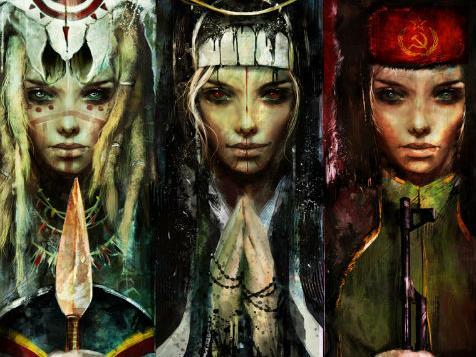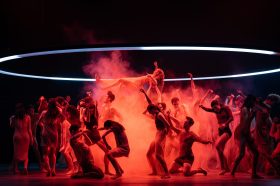Image: The Tribe by The Blue Room Theatre
Renegade Productions never shy away from the harder side of theatre, its polemic tradition. In The Tribe it comes attired in dramatically fascinating robes.
Joe Lui has devised a game of two halves, or possibly a musical work in two distinct parts – the first a sweetly simple melodic interlude, the second a richly complex fugue, an intricate interplay of characters and ideas.
To be more prosaic, the first part features an omnipotent God (Paul Grabovac), a drag queen diva, despairingly drunk in search of love, two angels, and a small sandpit within which lies all of human creation. The focus is on the angels, the sword-bearing, righteous Angel of Death (Ella Hetherington), and the light bearer, an increasingly disillusioned Morning Star (Mikala Westall). Set in a small workroom, with a curious collection of bizarre artefacts set about the shelves, the relationship between the two angels and God is foregrounded with a lovely progress through the Book of Genesis played out in the sandpit along the way. The story highlights the petty reason behind the initial creation of “tribes” at the Tower of Babel, and the true reasons for Lucifer’s fall from grace.
Grabovac’s capricious deity brought a coherency to the contradictory events that have marked the Abrahamic religious traditions, the greatness of being demanding a greater love from his creation than it seems capable of giving. He used his dramatic skills to bring us into the world of his confused, lost self, before letting his physically dominating frame give additional “oomph” to his transformation into a wrathful, vengeful godhead. Westall and Hetherington played against each other well, from childlike bickering, to existential debate and a back and forth wondering about the realities of love. The technical work was sympathetic and subtly done, at least during God’s absence from the stage. Lighting was key in keeping attention riveted on the finely executed interactions between the angels, and then emphasising the entrances and emotions of Grabovac’s God.
The second half saw a change of venue, to a downstairs room lacking the advantages of theatrical lighting or sound of the main theatres.
Opening with Hethington’s new character going through her day – she wakes, grooms, eats, watches tv, exercises – a simple process, never leaving her room. Grabovac, now attired in classic explorer garb, lurks and watches, and when she wakes again, he has started delivering his documentary lecture on “The Third Chimp”, describing humanity in terms of its relationship to chimpanzees and bonobos. The interplay of his commentary and her repeated routine casts everything in a new light. Westall’s fallen angel appears while she sleeps, disturbing her and starting a new day over. The back story of the girl’s arrival in this isolation is revealed, and then re-told – demonstrating that history is recorded differently depending on individual perspective. The lecture becomes more strident, impassioned, calling for humanity to throw off the shackles of antiquated habits of thought, working in with a change in the daily grind for the girl, positing that another way is possible.
Grabovac seized the opportunity to work with a more articulate character, delivering lines clearly and making hard-hitting points. Hetherington impressed with her ability to repeat physical moves precisely, allowing Grabovac to work around her and bringing a stylised intensity to the piece. Also noteworthy was the proficiency with which the cast worked in a performance space located between the audience, able to work effectively for both sides.
The technical work is particularly impressive in this venue as it lacks so many of the basic theatrical facilities. Actors turning lights on and off, bringing lamps through, turning a television on and off again – simple but effective devices worked around the lack of infrastructure. However the technician was on the ball, keeping the sound worked in precisely with the action.
Plenty of food for thought, presented beautifully. The Tribe is an intellectual and theatrical treat, as well as a cry for change in our world.
The Tribe
Presented by Renegade Productions and The Blue Room Theatre
Written and Directed by Joe Lui
Set and Costume Design: India Caitlin Mehta
Video Design: Mia Holton
Stage Manager: Meabh Walton
Production Manager: Katy Dynes
Performed by Ella Hetherington, Paul Grabovac, Mikala Westall
The Blue Room Theatre, Perth Cultural Centre, Northbridge
15 October – 2 November 2013





